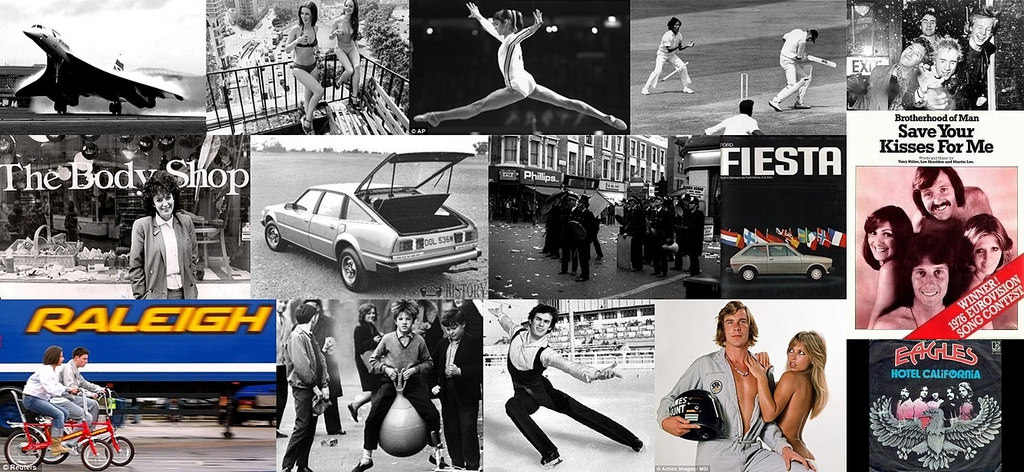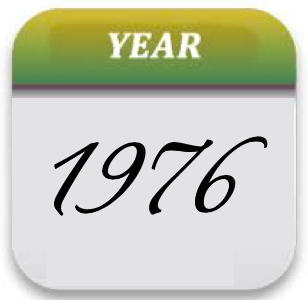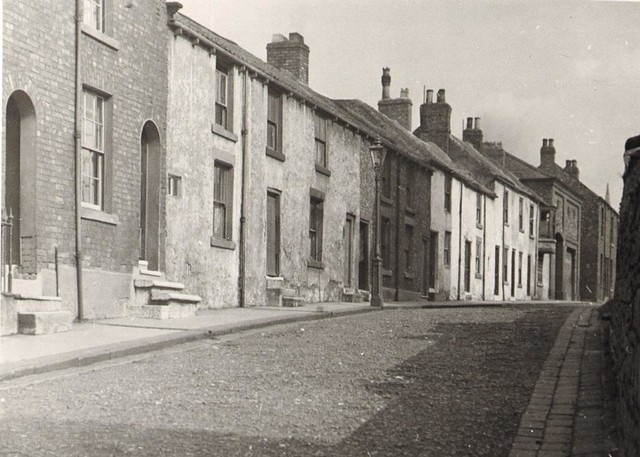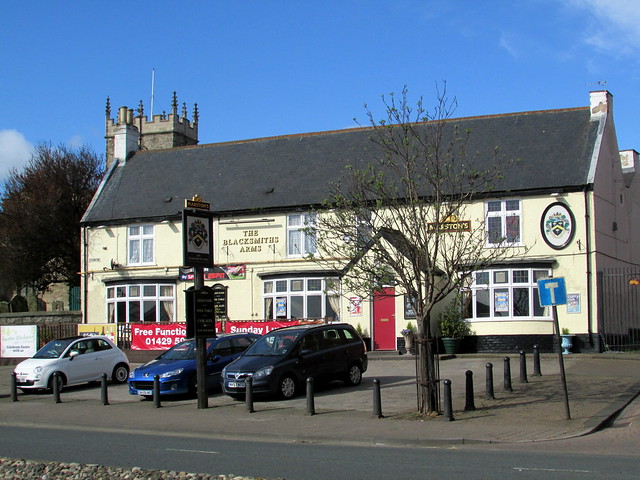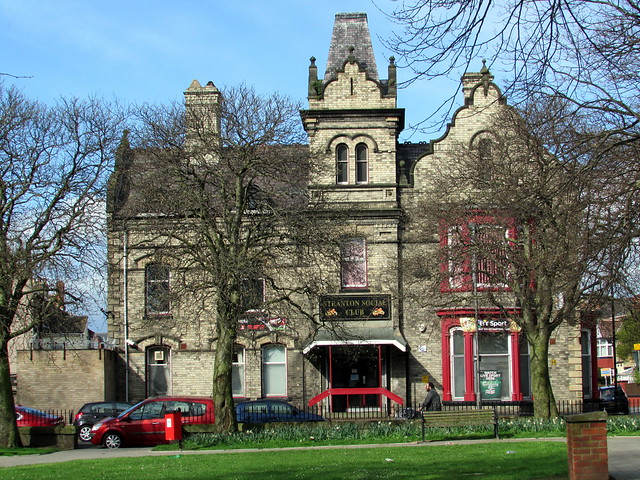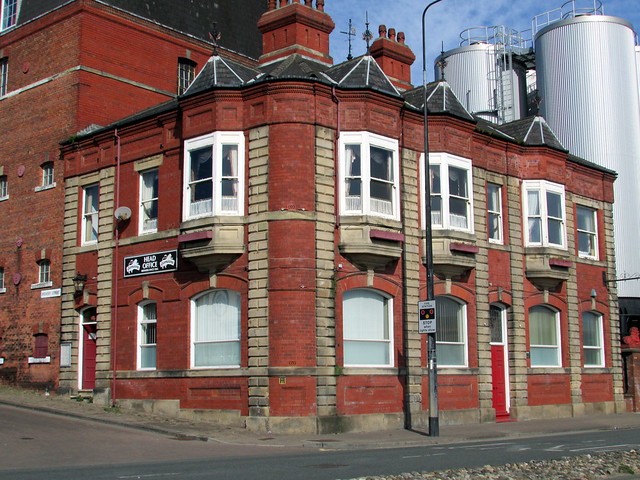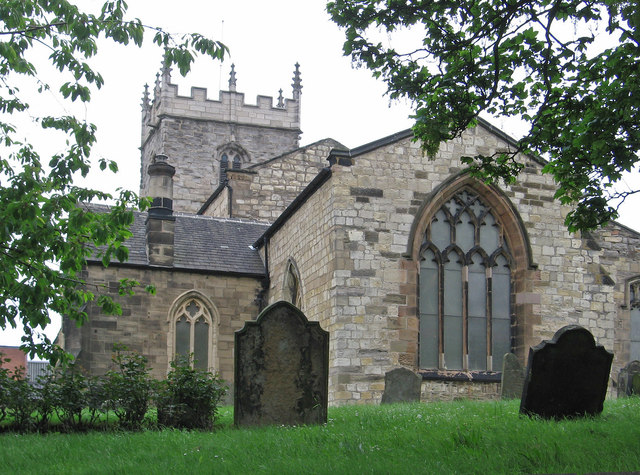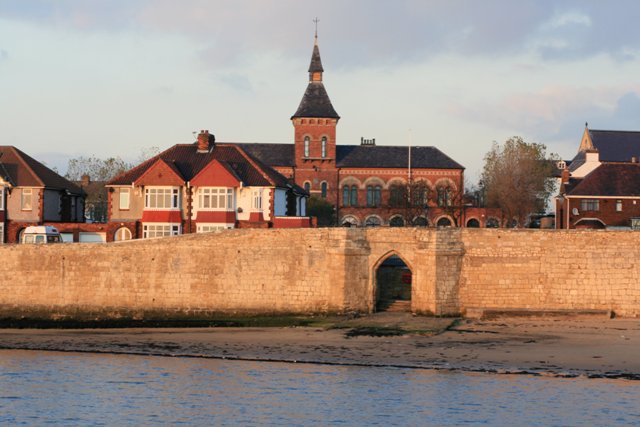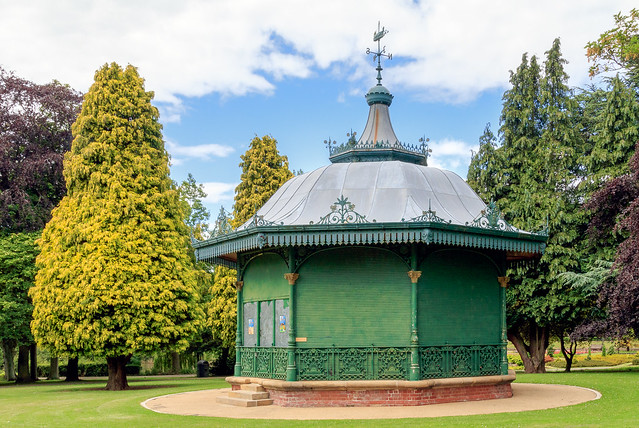That Was the Year That Was - 1976

-
Description
It saw the birth of punk and the death of Chairman Mao, it was a time when Britain was at its financial peak, even though the country was bailed out by the International Monetary Fund. 1976 Inflation continues to be a problem around the world. Concorde enters service and cuts transatlantic flying time to 3 1/2 hours. One year after Microsoft is formed Apple is formed by Steve Jobs and Steve Wozniak. Nadia Comaneci scores the first ever perfect score in Gymnastics. In South Africa Riots in Soweto on June 16th mark the beginning of the end of apartheid. In music the first of the Punk Bands appear The Damned release New Rose classified as Punk Rock Music. It was the year in which Harold Wilson resigned and Jimmy Carter became US President, a space probe landed on Mars. These were simpler times - fear of crime was low, people were less suspicious of others, and "traffic flowed freely and, by and large, British Rail was just wonderful". There were fewer lager louts and it was safe to go out clubbing on a Saturday night. There was less pressure for children and teenagers to live up to their peers -'keeping up with the Jones'. Children played in the parks and streets instead of becoming couch potatoes or computer geeks. The economy was in desperate straits. The reservoirs were empty. The government was in danger of falling apart. Youth unemployment was rising. And British sports people were preparing for an Olympic Games. There was a national water shortage, inflation reached 27 per cent, there were widespread strikes and the West Indies cricket team left us grovelling for mercy. Amid many strikes in public sectors, there was also raging inflation. Britain was forced into the humiliating position of asking international bankers to lend it billions of pounds, revealing the full scale of the economic failure the country was facing. It was a turbulent time for Britain, we agreed to keep trawlers out of Icelandic waters after a third “Cod War”. In the heat of the summer, riots broke out at the Notting Hill carnival. 100 police officers were taken to hospital after they tried to break up rioters armed only with dustbin lids and milk crates. It was a good year for technology, for 1976 saw the first commercial Concorde flight, the unveiling of the first space shuttle, Enterprise, and the start-up of a new business, the Apple Computer Company, by Steve Jobs and Steve Wozniak. And Matsushita introduced the VHS home video cassette recorder to compete with Sony's Betamax system. Cost of Living Strikes in public services were just something people had to deal with. The standard rate of tax stood at 35 pence in the pound. Inflation raged at around 17%. The industrial unrest and economic crisis led within a few years to the winter of discontent and then the Thatcher revolution. In terms of individual wealth, we were certainly poorer. The average wage was around £72 a week. Only half of us had phones - landlines, that is. No-one had a computer. Far fewer of us owned our own homes and it was much more difficult to get a mortgage. There was less crime and lower energy consumption because there were fewer cars and centrally-heated houses. In terms of quality of life, only half the country had a telephone, no one had a computer and just over half of homes were owner-occupied compared with seven in 10 today. Our quality of life was improved by an affordable cost of living – petrol was 77p a gallon, a pint 32p and a loaf 19p – low crime levels and fewer cars on the road. There was also a large investment in the public sector and a narrowing in the wage gap between the sexes. For the really wealthy there was a chance to travel on Concorde, which started flying from Heathrow to Bahrain that January. And for the rest of us we could book a seat on the first InterCity 125 trains or save up for one of the new Ford Fiestas or Mark IV Cortinas, costing £1,950. It was also the year of the Ford Fiesta, Rover SD1, Ford IV Cortina and the Hyundai Pony. There was less traffic on British roads in 1976, but far more people were killed on them – more than 6,000 deaths compared to fewer than 2,500 annually now. Cars now have better brakes, airbags, side-impact bars and drivers are less likely to be drunk and it is now illegal not to wear seatbelts, even in the back. It was actually far more risky to be a child cycling round 1970s Britain than it is today and greatly more dangerous to be a child passenger in a car. In 1976 we earned less money and we paid more tax (the basic rate then was 35 per cent rising to a pip-squeaking 83 per cent on earnings over £20,000 (about £110,000 today) and things largely cost far more than they do now. Travel abroad was still something of a luxury (currency restrictions were still in place meaning it was hard even if you had the cash) and largely restricted to the middle classes and above, although the era of the cheap package to Spain and elsewhere was beginning. Things that we think of as essentials – televisions, stereos, kitchen white goods and so forth were hugely expensive. In the mid-1970s a colour television cost two months’ salary; today, like all electronic goods prices have dropped in real terms by 80 per cent or more. Far fewer of us owned our own homes and it was much more difficult to get a mortgage. Interest rates hit a whopping 15 per cent in October. Yet despite all this the new study, the first-ever global snapshot of quality of life over time, reckons 1976 was a golden year for Britain. Clothes, travel and eating out were all significantly dearer back then, but university education (free, and you got a maintenance grant as well), public transport and some basic foodstuffs were cheaper. Petrol was cheaper too, although not by as much as we usually think. Adjusting for inflation, a litre of four-star in 1976 cost about 89p (£4 a gallon) but adjusting, again, for earning power (how much people actually had to spend on things like petrol) the real cost of motoring has fallen quite dramatically in the last four decades. As to the price of cars themselves, in 1976 a new, mid-range Ford Cortina cost around £18,000 in today’s money compared to about £16,500 for a Ford Focus in 2012). The major dent in our finances today is not the cost of petrol but the ludicrous price of housing, especially in South-East England. In 1976 even the wealthiest parts of London contained a number of lower-income householders; there were bits of Chelsea and Kensington that were actually quite shabby. Now, the most desirable parts of the Capital (some wards now have average house prices over the £2m mark) have become effectively sterilised by money, with housing so expensive that only offshore trusts, crooks and oligarchs can afford to buy it. But this is a local phenomenon; across much of England, Wales and Scotland housing is still relatively affordable. In most measurable ways things were no better in 1976, and in many ways worse, than they are now. We were poorer, paid more tax and most things cost more. We died sooner, smoked more and suffered more illness. We were less likely to be burgled, take drugs or have our car broken into but no less likely to be murdered, raped or robbed. And we mustn’t forget that in 1976 large sections of the population really were dramatically worse off than they are now. This was an era of casual racism and sexism, where women, gays, blacks and Asians could be openly discriminated against, where snobbery was still rife and where police corruption was so serious and widespread that 400 Metropolitan Police officers had to be quietly sacked. But what we are REALLY nostalgic for, of course, is not the weather, the clothes or the alleged freedom but our youth. And that we can never get back. Sport And in sport, it was hardly a year of triumph to be cherished as a golden era. On the cricket field England were walloped by Australia and the West Indies. Our much vaunted athletics team at the Montreal Olympics came back with just one bronze medal between them. Only dashing racing driver James Hunt saved the day somewhat by winning the Formula One championship. Lawrie McMenemy’s second division underdogs Southampton beat Manchester United 1-0 to win the FA Cup. This was one of the biggest upsets in cup history. Highlights included one of the hottest summers on record, the Montreal summer Olympics, and John Curry winning a gold medal for ice-skating in the winter Games. Southampton won the FA Cup. Other sporting triumphs in 76 came from British figure skater John Curry, who won Olympic gold in Innsbruck, and on the cricket field England we were walloped 3-0 by the West Indies and our much-vaunted athletics team at the Montreal Olympics came back with a single bronze, won in the 10,000 metres by Brendan Foster. Music It was also the year that, for many, the music died, with Abba and Elton John being elbowed aside by the rude young men of pop, including the Sex Pistols and the Clash. Fears of a younger generation with a safety pin through its nose stalked society; what punk might do to the country was a serious concern for many - not least the punks themselves. Punk rock group The Ramones released their first album, U2 got together and the Brotherhood of Man won the Eurovision Song Contest with Save Your Kisses for Me. Top selling singles of the year were ABBA with Dancing Queen, Queen with Bohemian Rhapsody - whose video more or less changed the face of pop music - and Chicago with If You Leave Me Now. Many outdoor festivals and shows were held in the U.S. as it celebrated its bicentennial - Elton John, The Eagles, Fleetwood Mac, Lynyrd Skynyrd and ZZ Top all drew huge crowds. Music fans bought Dancing Queen by Abba or Forever and Ever by Demis Roussos. Meanwhile the Stones were in full flow, with a 33-year-old Mick Jagger and Keith Richards, both now 69, playing in front of a reported 200,000 at Knebworth Fair. The band are still on the road, packing out Hyde Park and Glastonbury 37 years on. In the charts Brotherhood of Man’s Eurovision winner Save All Your Kisses For Me and The Wurzels’ Combine Harvester were firm favourites. Classic albums Hotel California by the Eagles and Stevie Wonder’s Songs in the Key of Life were released in 76 but there were signs of a shift in musical tastes. A shocked nation saw the Sex Pistols’ foul-mouthed TV interview with Bill Grundy and The Damned released New Rose, widely regarded as the first punk single. Some saw punk as the death of pop but to others it was bringing music back to life while raising two fingers to the establishment. Sex Pistols swear on live TV 1976 Punk rock band the Sex Pistols achieve public notoriety as they unleash several swearwords live on Bill Grundy's TV show, following the release of their debut single Anarchy in the U.K. on 26 November. Punk group The Sex Pistols cause a storm of controversy and outrage in the UK by swearing well before the watershed on the regional Thames Television news programme Today, hosted by Bill Grundy. Grundy, who has goaded them into doing so, is temporarily sacked. Today is replaced by Thames at Six a year later. https://www.youtube.com/watch?v=R0IAYFh0CaI" rel="nofollow">www.youtube.com/watch?v=R0IAYFh0CaI Film & Television Filming began on George Lucas' first Star Wars film. Among the films released that year were Sylvester Stallone's Rocky, the original Freaky Friday, starring Jodie Foster, and John Wayne's final film, The Shootist. On television, we were watching The Muppets, Starsky And Hutch and The Multi-Coloured Swap Shop, The Muppet Show, Starsky and Hutch. At the cinema, Sylvester Stallone captured everyone’s heart as gutsy boxer Rocky and the film clinched the best picture Oscar. But perhaps the most chilling performance of the year came Robert De Niro as Travis Bickle in Martin Scorsese’s Taxi Driver. On TV wheeler dealer Mike Baldwin, played by Johnny Briggs, started his 30-year stint on Coronation Street. THE SIZZLER OF '76 - one of the hottest summers on record Many people fondly remember the year when the mercury topped 28C (82F) for a record-breaking 22 days… and for once the nostalgia is not misplaced. It was the driest summer since 1772 so hours of sunny outdoor fun made 1976 a favourite. It's the weather that stands out in most people's memories. Day after day of temperatures in the 90s, as people rolled up their flared trousers to sunbathe in the park. That had its downside, of course, with a drought leading to scorched earth and hundreds of thousands of people dependent on standpipes for their water supply. There was even a Minister of Drought, Denis Howell, who within days of his appointment became Minister of Floods, as the heavens opened. Henry Kelly, who was on the radio even then, recalls the heatwave: "As a radio reporter I covered the old chestnut of a man frying eggs on the pavement near Oxford Circus." With the sunny weather here at last, We turn back the clock to the now legendary summer of 1976 - a year when the heat was really on Rationed: With water supplies running dry, many families had to rely on standpipes Heatwave: During the long, dry summer of 1976, even the mighty Chew Valley Reservoir virtually dried up AFTER basking in the sun for the last couple of weeks, let's hope we can look forward, with the help of a little global warming, to some long, hot summer days. We're certainly due them after a dismal winter and cold spring. But how many readers, I wonder, recall the record-breaking long, hot summer of 1976, now an unbelievable 30 years ago? If you do, you'll have memories of what a summer should really be like, with day after day of unbroken sunshine and temperatures in the 80s and 90s. Weathermen said that it was the hottest year overall since 1826, though it was just a little cooler in the West. But Bristol certainly had the hottest June on record. Readers of the Post were asked to 'cool it' as ice cream was rationed, kids stripped off and jumped into the pool in front of the Council House and tempers became frayed. The outdoor swimming pools, like Portishead and the old Clifton Lido, came into their own and shops reported shortages of suntan oil and sunglasses. Wildlife had a field day, with a plague of ladybirds descending on the seafronts at Clevedon and Weston-super-Mare. The local authorities started spreading sand on the roads to stop the tar from melting (which didn't work) and the water authorities became so stretched that they considered bringing in extra supplies to Avonmouth from Norway. Pupils at Winterbourne school were forced to attend lessons as the temperature topped 37.8 degrees in the classroom. But in more sensible Somerset, some children started school at 8am and finished at 1pm - missing at least some of the heat of the day. Despite constant warnings, youngsters just couldn't be stopped from diving into the area's many rivers and watercourses to cool off. More dangerously, many Bristol people started jumping into the icy, deep waters of the docks. By the end of June it was official - Bristol was England's hottest spot, with a temperature of 91F (33C). By this time many people had had enough of the heat - but amazingly it just went on and on, right throughout July and August. With temperatures at night remaining very high (63 degrees) people found that they couldn't sleep. In fact, you could still feel the heat wafting off the pavements at midnight. The weathermen tell us that it did rain, but amounts were very small, and soon drought conditions set in. Then, after over a month without rain, the brewery draymen went on strike - so we soon had beer rationing as well as water rationing to add to our misery. A hosepipe ban was implemented and the washing of cars was outlawed. There was much goverment advice on water-use, including the suggestion that only five inches of water was to be used in a bath, and that baths, it was daringly suggested, should be shared). A minister for drought, Denis Howell, was appointed. Just to prove he meant business a hastily conceived Drought Bill, implemented on July 14, allowed for fines of up to £400 for water misuse. On June 28, the record for the hottest June day was broken when 32.8C (91F) was recorded. August was a record month with an amazing 264 hours of sunshine - more than eight hours a day. But not everyone lapped up the sun. There were casualties. In July, a local woman died from hyperpyrexia - caused by not drinking enough water or having enough salt in hot weather. It was something usually restricted to countries with very hot climates. Wildlife suffered, too. Thousands of salmon and trout died in the region's rivers as the water became starved of oxygen. Many trees, especially those which had just started to recover from Dutch elm disease - started to wilt and die. Dust clouds covered the land as firemen strugled to cope with up to 20 grass-fires a day. In the Cotswolds, so-called dust-devils were reported. These were small whirlwinds which only occur on fine, hot days. Brooks and springs which had never been known to dry up, even in the hottest weather, did just that and bowling greens and golf courses closed their doors to members as their 'greens' turned to 'browns'. Water was being lost by evaporation from the Mendip reservoirs at an alarming rate - nearly six million litres a day throughout August. The level in the vast Chew Valley reservoir fell so low that visitors could actually walk on the exposed baked earth and make out the old road bridges and skeletal remains of long-since drowned farms. As temperatures stayed in the 90s, many country areas came to rely on standpipes and buckets of water. Some, with very limited supply, or even none at all, had water delivered by tanker. Finally, on August 28, the worst drought since 1921 came to an end with violent storms and flooding. Strangely, many people stood at their back doors and welcomed the rain back with open arms. 1976 The Murders of the Yorkshire Ripper 20 January – 42-year-old married woman Emily Jackson is stabbed to death in Leeds; it is revealed that she was a part-time prostitute. Police believe she may have been killed by the same man who murdered Wilma McCann in the city three months ago. Sutcliffe's assaults on Rogulsky, Smelt and Tracey Browne were puzzling random attacks on women but not regarded in the same mould as the murder of Wilma McCann in Leeds or indeed of Joan Harrison in Preston. Wilma's killing was the first linked Ripper murder and was probably motivated by Tracey's desire to rob her, a prostitute nearly at home after a night on the town, with extreme violence, rather than a planned commencement of a series of ritual murders. Harrison was also robbed. 'The well-described stocky bearded Irishman seen with Emily Jackson was never traced. Mrs Jackson was never seen alive again and her van lay parked in the Gaiety car park to which she never returned. This man was always believed to be her killer by the police and his description is quite different to Peter Sutcliffe. This man or a similarly described man was observed at the scene of two subsequent Ripper murders. These fact along with many others shows that Peter Sutcliffe didn't commit the murder of Emily Jackson.' 9 May – 20-year-old Leeds prostitute Marcella Claxton is badly injured in a hammer attack. Marcella Claxton, aged 20, and a prostitute, was attacked in Leeds in the early hours of Sunday, May 9 1976. The police did not link the attack to the Yorkshire Ripper series, though they did re-examine the file after the next murder in February 1977. 1976 Timeline January – Korean cars are officially imported to the United Kingdom for the first time, as Hyundai launches its Pony family saloon on the British market. 2 January – Hurricane-force winds of up to 105 mph kill 22 people across Britain and cause millions of pounds worth of damage to buildings and vehicles. 5 January – Ten Protestant men are killed in the Kingsmill massacre at South Armagh, Northern Ireland, by members of the Provisional Irish Republican Army, using the cover name "South Armagh Republican Action Force". 7 January – Cod War: British and Icelandic ships clash at sea. 18 January – The Scottish Labour Party is formed. 20 January – 42-year-old married woman Emily Jackson is stabbed to death in Leeds; it is revealed that she was a part-time prostitute. Police believe she may have been killed by the same man who murdered Wilma McCann in the city three months ago. 21 January – The first commercial Concorde flight takes off. 29 January – Twelve Provisional Irish Republican Army bombs explode in London's West End. 2 February – The Queen opens the new National Exhibition Centre in Birmingham, situated near the city's airport. 4–15 February – Great Britain and Northern Ireland compete at the Winter Olympics in Innsbruck, Austria, and win one gold medal. 11 February – John Curry becomes Britain's first gold medalist in skating at the Winter Olympics. 19 February – Iceland breaks off diplomatic relations with Britain over the Cod War. March – Production of the Hillman Imp ends after 13 years. It is due to be replaced next year by a three-door hatchback based on a shortened Avenger floorpan. 1 March – Merlyn Rees ends Special Category Status for those sentenced for crimes relating to the civil violence in Northern Ireland. 4 March - The Maguire Seven are found guilty of the offence of possessing explosives and subsequently jailed for 14 years. 6 March - EMI Records reissues all 22 previously released British Beatles singles, plus a new single of the classic "Yesterday". All 23 singles hit the UK charts at the same time. 7 March - A wax likeness of Elton John is put on display in London's Madame Tussaud's Wax Museum. The Northern Ireland Constitutional Convention is formally dissolved in Northern Ireland resulting in direct rule of Northern Ireland from London via the British parliament. 9 March - The Who's Keith Moon collapses on stage ten minutes into a performance at the Boston Garden. 16 March – Harold Wilson announces his resignation as Prime Minister of the United Kingdom, to take effect on 5 April. 19 March – Princess Margaret and Lord Snowdon announce that they are to separate after 16 years of marriage. 26 March – Anita Roddick opens the first branch of The Body Shop in Brighton. 3 April – The United Kingdom wins the Eurovision Song Contest for the third time with the song "Save Your Kisses for Me", sung by Brotherhood of Man. It remains one of the biggest-selling Eurovision songs ever. 5 April – James Callaghan becomes Prime Minister of the United Kingdom upon the retirement of Harold Wilson, defeating Roy Jenkins and Michael Foot in the leadership contest. Callaghan, 64, was previously Foreign Secretary and had served as a chancellor and later Home Secretary under Wilson in government from 1964 until 1970. 7 April – Cabinet minister John Stonehouse resigns from the Labour Party leaving the Government without a majority in the House of Commons. 9 April – Young Liberals president Peter Hain is cleared of stealing £490 from a branch of Barclays Bank. 26 April – Comedy actor and Carry On star Sid James dies on stage at the Sunderland Empire Theatre having suffered a fatal heart attack. 1 May – Southampton F.C. win the first major trophy of their 91-year history when a goal from Bobby Stokes gives the Football League Second Division club a surprise 1-0 win over Manchester United in the FA Cup Final at Wembley Stadium. 3 May - Paul McCartney and Wings start their Wings over America Tour in Fort Worth, Texas. This is the first time McCartney has performed in the US since The Beatles' last concert in 1966 at Candlestick Park. 4 May – Liverpool F.C. clinch their ninth Football League title with a 3-1 away win over relegated Wolverhampton Wanderers, fighting off a close challenge from underdogs Queen's Park Rangers. 6 May – Local council elections produce disappointing results for the Labour Party, who won just 15 seats and lost 829 that they had held, compared to the Conservatives who won 1,044 new seats and lost a mere 22. This setback came despite the party enjoying a narrow lead in the opinion polls under new leader James Callaghan. 9 May – 20-year-old Leeds prostitute Marcella Claxton is badly injured in a hammer attack. 10 May – Jeremy Thorpe resigns as leader of the Liberal party. 19 May – Liverpool win the UEFA Cup for the second time by completing a 4-3 aggregate victory over the Belgian side Club Brugge K.V. 20 May - Rolling Stones guitarist Keith Richards is involved in a car accident. Cocaine is found in his wrecked car. Richards is given a court date of 12 January 1977. 27 May – Harold Wilson's Resignation Honours List is published. It controversially awards honours to many wealthy businessmen, and comes to be known satirically as the "Lavender List". June – British Leyland launches its innovative new Rover SD1, a large five-door hatchback that replaces the ageing P6 series. 1 June – UK and Iceland end the Cod War. 14 June – The trial for murder of Donald Neilson, known as the "Black Panther", begins at Oxford Crown Court. 22 June–16 July – Heat wave reaches its peak with the temperature attaining 26.7°C (80°F) every day of this period. For 15 consecutive days, 23 June–7 July inclusive, it reaches 32.2°C (90°F) somewhere in England; and five days - the first being 26 June - see the temperature exceed 35°C (95°F). This is contributing to the worst drought in the United Kingdom since the 1720s. 28 June – In the heat wave, the temperature reaches 35.6°C (96.1°F) in Southampton, the highest recorded for June in the UK. 29 June – The Seychelles become independent of the UK. 2 July - Benjamin Britten is created Baron Britten of Aldeburgh in the County of Suffolk, less than six months before his death. 3 July – Heat wave peaks with temperatures reaching 35.9°C (96.6°F) in Cheltenham. 7 July – David Steel is elected as new leader of the Liberal Party. 10 July – Three British and one American mercenaries are shot by firing squad in Angola. 14 July – Ford launches a new small three-door hatchback, the Fiesta - its first front-wheel drive transverse engined production model - which is similar in concept to the Vauxhall Chevette and German car maker Volkswagen's new Polo. It will be built in several factories across Europe, including the Dagenham plant in Essex (where 3,000 jobs will be created), and continental sales begin later this year, although it will not go on sale in Britain until January 1977. 17 July–1 August – Great Britain and Northern Ireland compete at the Olympics in Montreal, Canada, and win 3 gold, 5 silver and 5 bronze medals. 21 July – Christopher Ewart-Biggs, the UK ambassador to Ireland, and a civil servant, Judith Cooke, are killed by a landmine at Sandyford, Co. Dublin. 22 July – Dangerous Wild Animals Act requires licences for the keeping of certain animals in captivity. 27 July – United Kingdom breaks diplomatic relations with Uganda. 29 July – A fire destroys the pier head at Southend Pier. August - Drought at its most severe. Parts of South West England go for 45 days with no rain in July and August. Government and Trades Union Congress agree a more severe Stage II one-year limit on pay rises. 5 August – The Great Clock of Westminster (or Big Ben) suffers internal damage and stops running for over nine months. 6 August – The last Postmaster General, John Stonehouse, is sentenced to seven years in jail for fraud. 14 August – 10,000 Protestant and Catholic women demonstrate for peace in Northern Ireland. 30 August – 100 police officers and 60 carnival-goers are injured during riots at the Notting Hill Carnival. September – Chrysler Europe abandons the 69-year-old Hillman marque for its British-built cars and adopts the Chrysler name for the entire range. 1 September – Drought measures introduced in Yorkshire. 3 September – Riot at Hull Prison ends. 4 September – Peace March in Derry attracts 25,000 people in a call to end violence in Northern Ireland. 9 September – The Royal Shakespeare Company opens a memorable production of Shakespeare’s Macbeth at The Other Place, Stratford-upon-Avon, with Ian McKellen and Judi Dench in the lead roles, directed by Trevor Nunn. 12 September – Portsmouth football club, who were FA Cup winners in 1939 and league champions in 1949 and 1950 but are now in the Football League Third Division, are reported to be on the brink of bankruptcy with huge debts. 20 September & 21 September - 100 Club Punk Festival, the first international punk festival is held in London. Siouxsie and the Banshees play their first concert. 23 September – A fire on the destroyer HMS Glasgow while being fitted out at Swan Hunter' yard at Wallsend on Tyne kills eight men. 29 September – The Ford Cortina Mark IV is launched. 4 October – InterCity 125 trains are introduced on British Rail between London and Bristol. 8 October - The Sex Pistols sign a contract with EMI Records. 15 October – Two members of the Ulster Defence Regiment jailed for 35 years for murder of the members of the Republic of Ireland cabaret performers Miami Showband. 22 October – The Damned release New Rose, the first ever single marketed as "punk rock". 24 October – Racing driver James Hunt becomes Formula One world champion. 25 October – Opening of the Royal National Theatre on the South Bank in London, in premises designed by Sir Denys Lasdun. 29 October – Opening of Selby Coalfield. 16 November – The seven perpetrators of an £8 million van robbery at the Bank of America in Mayfair are sentenced to a total of 100 years in jail. 1 December – Punk rock band the Sex Pistols achieve public notoriety as they unleash several swearwords live on Bill Grundy's TV show, following the release of their debut single Anarchy in the U.K. on 26 November. 10 December – Betty Williams and Mairead Corrigan win the Nobel Peace Prize. 15 December – Denis Healey announces to Parliament that he has successfully negotiated a £2.3 billion loan for Britain from the International Monetary Fund on condition that £2.5 billion is cut from public expenditure: the NHS, education and social benefit sectors are not affected by these cuts. Inflation stands at 16.5% - lower than last year's level, but still one of the highest since records began in 1750. However, at one stage during this year inflation exceeded 24%. Opening of Rutland Water, the largest reservoir in England by surface area (1,212 hectares (2,995 acres)). First purpose-built (Thai style) Buddhist temple built in Britain, the Wat Buddhapadipa in Wimbledon, London. Television 3 April – The 21st Eurovision Song Contest is won by Brotherhood of Man, representing the United Kingdom, with their song "Save Your Kisses for Me". 5 April – Patricia Phoenix returns to the role of Elsie Tanner on Coronation Street after an absence of three years. 7 April – Margot Bryant makes her last appearance as Minnie Caldwell on Coronation Street. 1 July – US Sci-Fi series The Bionic Woman makes its debut at No.1 in the ratings – an almost unheard of event for a Sci-Fi series. 1 December – Punk group The Sex Pistols cause a storm of controversy and outrage in the UK by swearing well before the watershed on the regional Thames Television news programme Today, hosted by Bill Grundy. Grundy, who has goaded them into doing so, is temporarily sacked. Today is replaced by Thames at Six a year later. Dennis Potter's Play for Today Brimstone and Treacle is pulled from transmission on BBC1 due to controversy over its content, including the rape of a woman by the devil. It is eventually screened on BBC2 in 1987, after having been made into a film starring Sting in 1982. BBC1 6 January – Rentaghost (1976–1984) 8 January – When the Boat Comes In (1976–1981) 8 September – The Fall and Rise of Reginald Perrin (1976–1979) 2 October – Multi-Coloured Swap Shop (1976–1982) BBC2 17 February – One Man and His Dog (1976–present) 20 February – Open All Hours (BBC2 1976, BBC1 1981–1982, 1985, 2013) ITV 1 July – The Bionic Woman (1976–1978, 2007) 1 September – Star Maidens (1976) 6 September – George and Mildred (1976–1979) 27 September – The Muppet Show (1976–1981) Chorlton and the Wheelies (1976–1979) 19 October – The New Avengers (1976–1977) Music This year saw the emergence of disco as a force to be reckoned with, a trend which would hold for the rest of the decade and peak in the last two years. This was also the year which truly established ABBA as the top selling act of the decade with them achieving their second, third and fourth number ones (as well as releasing the biggest-selling album of the year). The ABBA formula was also replicated in the biggest-selling song of the year - the Eurovision-winning "Save Your Kisses for Me" by Brotherhood of Man, who began a three-year run in the UK charts from 1976. Other acts to achieve notable firsts were Elton John, who scored his first UK number one single this year (albeit as a duet with Kiki Dee), Showaddywaddy had their first and only number one and long-standing hit-maker Johnny Mathis also scored his biggest hit this year. The album charts saw TV advertising become a major factor in changing the landscape of big sellers with non-regular singles artists achieving high sales with compilations. Among these were Slim Whitman, Bert Weedon, Glen Campbell and The Beach Boys, who remained at number one for ten consecutive weeks. Also emerging this year was a new trend, which became known as punk rock. This was little evident on the charts as yet, and was more a lifestyle choice, but would become much more significant the following year, as many new acts who typified the trend came onto the scene. Overall, 1976 is not considered a vintage year by music critics, with its overwhelming dominance by pop and MOR acts. Certainly, many consider 1976 to be the nadir of British music and hold the year's charts up to be the very reason why Punk and New Wave music emerged with such force the following year. Britain's foremost classical composers of the late 20th century, including Sir William Walton, Benjamin Britten and Sir Michael Tippett, were still active. Sir Charles Groves conducted the Last Night of the Proms, and the soloist for "Rule Britannia" was contralto Anne Collins; the programme included Walton's Portsmouth Point overture. Number One singles "Bohemian Rhapsody" - Queen "Mamma Mia" - ABBA "Forever and Ever" - Slik "December, 1963 (Oh, What a Night)" - The Four Seasons "I Love to Love (But My Baby Loves to Dance)" - Tina Charles "Save Your Kisses for Me" - Brotherhood of Man "Fernando" - ABBA "No Charge" - J.J. Barrie "The Combine Harvester (Brand New Key)" - The Wurzels "You to Me Are Everything" - Real Thing "The Roussos Phenomenon EP" - Demis Roussos "Don't Go Breaking My Heart" - Elton John and Kiki Dee "Dancing Queen" - ABBA "Mississippi" - Pussycat "If You Leave Me Now" - Chicago "Under the Moon of Love" - Showaddywaddy "When a Child Is Born" - Johnny Mathis -
Owner
brizzle born and bred -
Source
Flickr (Flickr) -
License
What does this mean? Attribution-NonCommercial-ShareAlike License
-
Further information
Link: https://www.flickr.com/photos/20654194@N07/17693653116/
Resource type: Image
Added by: Peter Smith
Last modified: 7 years, 11 months ago
Viewed: 1213 times
Picture Taken: 2015-05-16T09:57:25 -
Co-Curate tags
